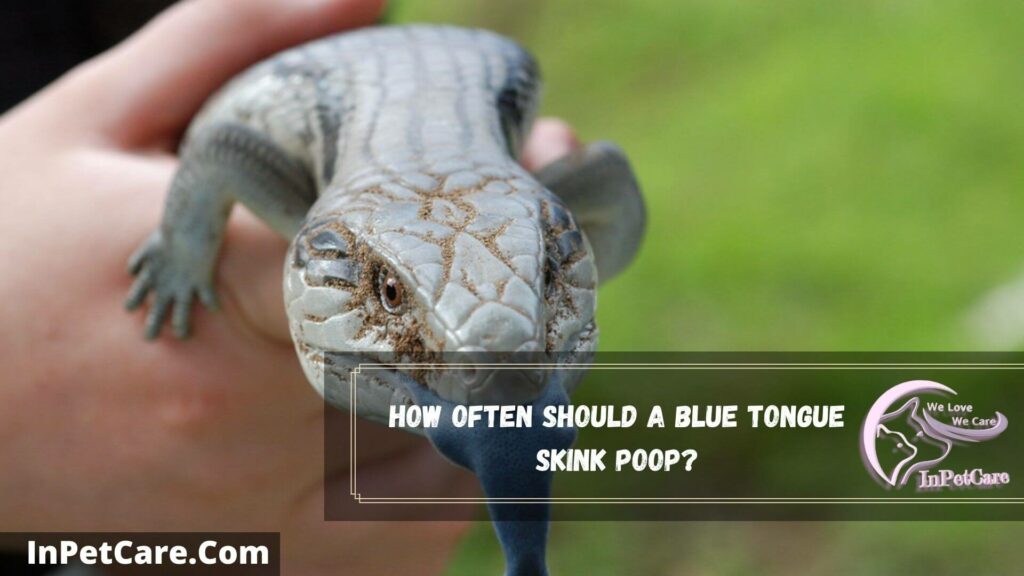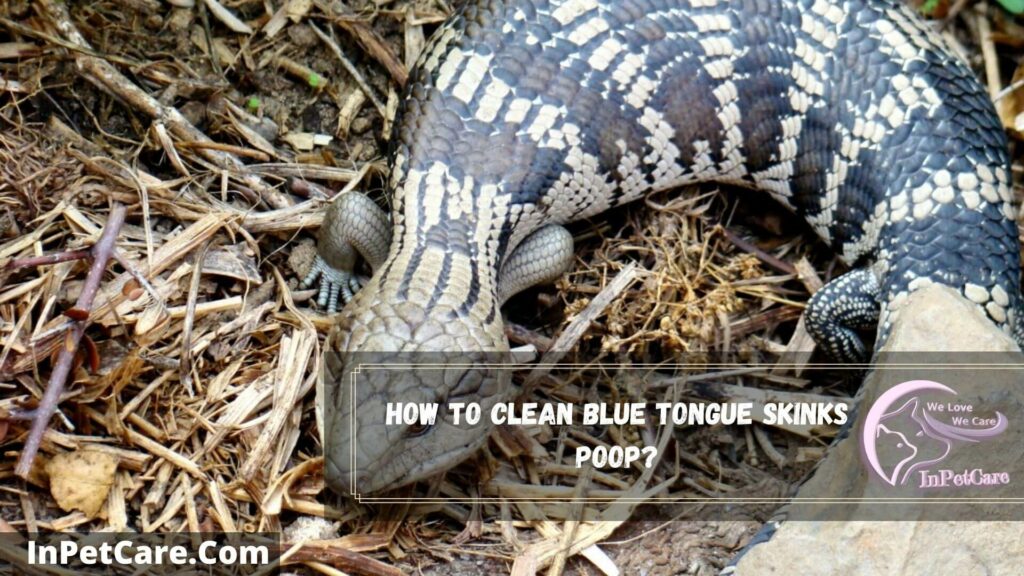There are three different types of blue tongue skinks poop. However, healthy blue tongue skink poop is white and brown. Sometimes, you can notice that skink’s poop going too smelly, running, yellow, bloody, or watery.
It is imperative to know what poop of your blue tongue lizard is healthy and whatnot. Believe it or not, its poop texture, color, and pooping frequency need to be observed as they are vital health indicators. It may not sound enjoyable, but keeping an eye on your blue tongue skink is one of the best ideas to learn their health and react accordingly.
In this article, I have highlighted how often do/should a blue tongue skinks poop more. You will also know what a healthy skink poop looks like and what to do when blue tongue skinks poop smells.
Post Contents
- Is Skink Poop Dangerous?
- How Often Bo Blue Tongue Skinks Poop?
- How Often Should A Blue Tongue Skink Poop?
- What Does Skink Up Look Like?
- What Does Healthy Skink Poop Look Like?
- Does A Blue Tongue Skink Poop Smell?
- Why Do Blue Tongue Skink Poop Smell So Much?
- How To Get Rid Of The Skink Poop Smell?
- How To Clean Blue Tongue Skinks Poop?
- Final Thought
Is Skink Poop Dangerous?
No, when touched but yes, when ingested. Blue tongue skinks poop contain salmonella bacteria which is common in lizard droppings. It can get easily transferred to humans if the wastes or the faeces enter the mouth.
It is essential to wash the vegetables before eating them thoroughly. You should also avoid inhaling the dust of their dried faeces as well. Bluetongue skink poop is only dangerous when ingested through the mouth intentionally or accidentally.
How Often Bo Blue Tongue Skinks Poop?
Baby blue tongue skinks generally poop once a day because they eat a lot. In contrast, adult ones will poop once in two or three days depending upon individual activity level and varying conditions.
It can be hard to say how often the blue tongue skinks poop as it depends on unique personality, activity level, state, and digestion. Some may poop after 3 to 4 hours of eating, while others may not due to different activity levels, temperatures, and habits.
How Often Should A Blue Tongue Skink Poop?

It varies a lot. Each blue tongue skink will have an individual personality, habit, and activity level with varying conditions. It can make it difficult to understand and tell how often should they poop. Only a few skinks manage to achieve consistency indigestion and activities. Skinks tend to hold them until they find wherever their potty is.
Some skinks have a habit of pooping on a particular spot like the warmer side of the tank. We have seen some skinks pooping 12 to 14 hours after eating while some immediately within an hour after eating. So, as I said, the time of skink to discharge their waste varies with temperature, varying conditions, habits, activity levels, and personality of individual blue tongue skink.
It is usual for adult blue tongue skink to poop once in 3 or 4 days. It would help if you didn’t worry unless there has been no corresponding excretion after a week or more. Lizards like blue tongue skinks need heat and temperature gradient in their tank to digest food and poop well.
What Does Skink Up Look Like?
A blue tongue skink poop looks very pasty ready to stick on any surface. It will usually be in solid form instead of being very hard or elongated. It will have white and brown parts. Sometimes, skink poop can look bloody, yellow, watery, completely white, and chalky hard.
This kind of sign in their poop is not good. It usually indicates an underlying health issue in your blue tongue skink. Don’t worry, as I have also discussed these signs, their meaning, and the solution in this article to know.
What Does Healthy Skink Poop Look Like?
A healthy skink pope will have two parts whitish and brownish. If they are having proper meals, metabolism, and digestion, both amounts will be solid. If their poop looks hard or round, there is something wrong. The brown part of the blue tongue skink tends to be the digested matter. At the same time, the white piece of the skink poop is the urate (pee).
The white part should look a bit solid in form compared to the brownish part as its job is to conserve more water in the blue tongue skink body. The only thing that can tell you if they’re healthy or not is their poop look. A healthy Skink poop and pee will be a very pasty that can stick to any surface.
Does A Blue Tongue Skink Poop Smell?
Yes. The brownish part is usually the digested matter that is more in odor, but it will not make your home smelly a lot.
The whitish part is usually water without any sent. You can get rid of poop smell using home spray or by sealing its enclosure. Although their poop smell, let’s learn why does a blue tongue skink smell so much?
Why Do Blue Tongue Skink Poop Smell So Much?
Blue time skink poop smells so much because of the bacteria present inside it. The feces attacked by parasites smells more awful than usual. Another possible reason could be their diet. Some vegetables and insects have extra smelly sticky poop as well. Maybe, correction is needed in their diet if there is a smell terrible.
Let’s learn how to reduce the blue tongue skink poop smell. Never leave the lid of its enclosure open otherwise, the odor can get around your house, which you don’t want. It would help if you also considered cleaning their habitat occasionally, at least once a week.
How To Get Rid Of The Skink Poop Smell?
Here are the followings to get rid of the skink poop smell.
- Keep their enclosure sealed using a moisture absorbing lid or substrate .
- Consider cleaning your blue tongue skink enclosure every day and its accessories. If the substrate is too moist, change it.
- Remove uneaten food to prevent it from decomposing. Decomposed food also produce a terrible smell.
- The best way is to clean their poop immediately after it excretes or once you notice it.
- Parasites and bacterias are the main culprits of a very foul-smelling poop. Moist substrate inside its tank will always thrive bacterias. Consider keeping its enclosure, and the substrate dry most of the time.
- Always give a warm water bath to your blue tongue skink for better digestion.
- Keep a room spray and use it if needed.
How To Clean Blue Tongue Skinks Poop?

It is essential to clean the spot where the poop is as soon as you notice. If you Don’t clean their poop and leave it as it is; it can become a threat to your blue tongue skin health. It can also be a threat to your health and your household as a whole. Here is the right step to clean blue tongue skink poop.
- Wear a glove.
- Use your hand to pick up the substrates along with faeces and pack them sealed.
- Clean the substrate using disinfectant and refill it. It would help if you used disinfectant in the tank once a week at least.
- Dispose all packed sealed excretes.
- Wipe off the glass, the tank’s walls, and its accessory using vinegar or water solution.
- If you have carpet in their tank, consider changing it weekly and a quick wipe down daily. It is essential to sanitize their tank every other week.
- Wash your hands thoroughly before and after cleaning the tank and its poop.
- Always wash your hands after handling your blue tongue skink to prevent any spread of infections.
Blue Tongue Skink Runny Poop Meaning & Its Solution
If a blue tongue skink is defecating runny poop, they might be suffering from diarrhea. The leading cause of running poop tends to be overfeeding or tummy upset. If your skink’s poop is in brown and white color but runny get them to the nearest veterinarian as soon as possible. There is nothing a lot to concern when noticing a liquid poop unless it is indifferent color.
Blue Tongue Skink White Poop Meaning & Its Solution
If your blue tongue skink is pooping white and brown, everything is ok. Brownish and whitish poop together indicates excellent health conditions in skinks.
However, if your blue tongue skink is pooping only white, it must be due to overhydration. Another thing to notice is its poop color & hardness. If it looks very hard or off-color, it may be because of too much calcium in their diet. Consider lowering it.
Blue Tongue Skink Yellow Poop Meaning & Its Solution
Blue tongue skink also poops yellow due to dietary issues. However, the primary reason behind yellow poop can be red fruits. If you notice that poop is off-color yellow, your skink is dehydrated and not getting enough water. Sometimes, yellow poop is also an indicator of liver problems in Skinks which is rare. If the blue tongue skink continues to poop yellow; take the sample of your skink blood and its poop to your nearest veterinarian to be sure.
Blue Tongue Skink Green Poop Meaning & Its Solution
Blue tongue skink poops green when there is a problem in their diet. First of all, you need to evaluate your blue tongue skink diet and husbandry. Make sure they are getting enough dark leafy greens. Another reason for green poop could be more fruits with high sugar in their dietary routine compared to green vegetables.
A blue tongue skink diet should consist of 50% plant-based, 40% protein-based, and 10% fresh fruit. You should consider feeding legumes, leafy greens, and other vegetables with a small amount of protein in moderation as an enhancement. The protein content in their diet should be animal-based.
Final Thought
I hope I managed to give you all the information needed on the blue tongue skink poop. Every blue tongue skink owner should be aware of what poop is healthy and what is not. A baby skink poops once a day because they eat a lot to promote their growth. On the other hand, adults skinks poop immediately or after 3 or 4 days, depending on their habit, varying conditions, individual activity level, and diet.
I hope I managed to give you all the information needed on blue tongue skink pooping. If you liked this article, then consider sharing this one. Make sure to check out our valuable resource on how to care for blue tongue skinks.

94% of pet owners say their animal pal makes them smile more than once a day. In 2007, I realized that I was made for saving Animals. My father is a Vet, and I think every pet deserves one. I started this blog, “InPetCare”, in 2019 with my father to enlighten a wider audience.
